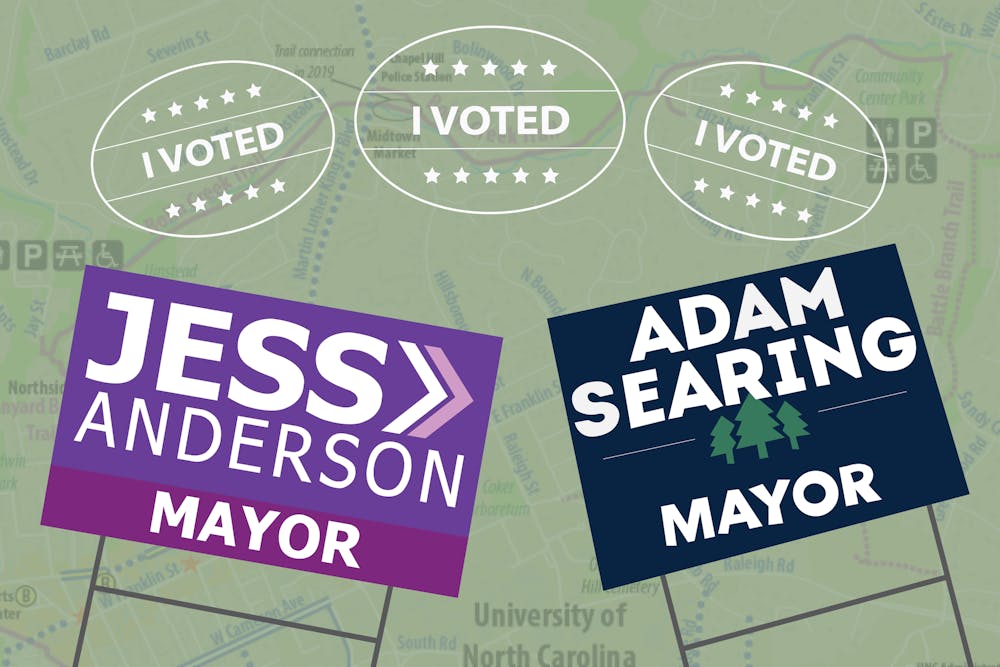The amendment was debated extensively, with a council meeting devoted solely to public comment on it. Searing voted against the amendment and Anderson voted for it.
Searing has assured his supporters that if elected, he will work to reverse this amendment immediately. On his campaign website, he said that part of his reasoning for opposing the amendment was that it would only apply to neighborhoods with older or "more modest" homes.
"How can I support a change that wouldn’t even apply to my neighborhood or the neighborhoods of a majority of town council members?" he said on his website.
According to the Town's website, the LUMO change cannot override existing neighborhood covenants that only allow single-family properties.
Neighborhood covenants are created by residents and can be amended. When covenants and municipal zoning ordinances contradict each other, the more restrictive regulation takes precedence.
Anderson said the text amendment only allows duplexes the size of single-family homes to be built in single-family neighborhoods.
"This is not this is not going to erode the 'character' of anyone's neighborhood," Anderson said.
The Town's website said that the height of these multi-family structures will not be greater than the height allowed by the zoning district. Furthermore, zoning has not changed since the ordinance went into effect.
Searing said on his website that a study shows that loosening zoning restrictions doesn't make housing more affordable or accessible.
Anderson said that the amendment's purpose was to allow people who cannot afford the "whole home" to be able to afford "half a home."
According to a Town staff presentation, increasing affordable housing was not a stated purpose of the Housing Choices LUMO amendment.
The study Searing cites found that zoning changes alone do not increase the availability of affordable housing, but the authors suggested that this is possible when municipalities pair zoning reforms with investments in housing subsidies.
To get the day's news and headlines in your inbox each morning, sign up for our email newsletters.
One goal of the Town's recently passed Affordable Housing Plan is to dedicate consistent funding sources to affordable housing investments.
Residential property taxes and coal ash
Searing said in a Sept. 27 blog post on his website that the Town's most recent budget will raise property tax rates by 11 percent. He also said it raised property taxes by almost 10 percent under his "Issues" page on his website.
This year's budget will raise the property tax rate by about 9.6 percent.
His website also said that Chapel Hill residents pay the highest average property taxes in the Southeast after the recent increase. Searing was the sole vote against the budget; Anderson voted for it.
Chapel Hill residents in Orange County pay more in property taxes than other counties in North Carolina, according to the Tax Foundation. The Town’s property tax rate is not the highest in the region. There are 193 towns and cities in North Carolina that have higher municipal property tax rates.
Property taxes are determined by the value of the home, owners of the most expensive homes pay the most.
Another issue community members and the two mayoral candidates are talking about is the future of 828 Martin Luther King Jr. Blvd., where coal ash was discovered in 2013.
The site is currently home to the Chapel Hill Police Department and has been a controversial issue in the Town.
Searing's campaign website said the Town plans to build a new municipal services center on the site and said the council has not completely ruled out building family housing on the site.
During a town council meeting in March, Town Manager Chris Blue updated the council about the future of the site. He said in the presentation that housing had been eliminated from the plan.
Searing expressed concerns about putting housing on the site and asked Town staff if housing would be considered in the future. Staff said that the N.C. Department of Environmental Quality will draft a brownfields agreement based on the current concept plan, which does not include housing.
If a future council wished to put housing at 828 MLK, they would have to repeat the brownfields program and amend the original agreement.
"There has been a lot of confusion about what's actually been decided and how much work has gone into the decisions [the council has] made so far," Anderson said.
Jane Pinsky, the director of the NC Coalition for Lobbying and Government Reform, said that sometimes misinformation can result in people not voting if they feel it won’t matter or they don't trust candidates.
“I think we all need to realize that we can make a difference,” she said.
@fanning_sophia
@DTHCityState | city@dailytarheel.com



